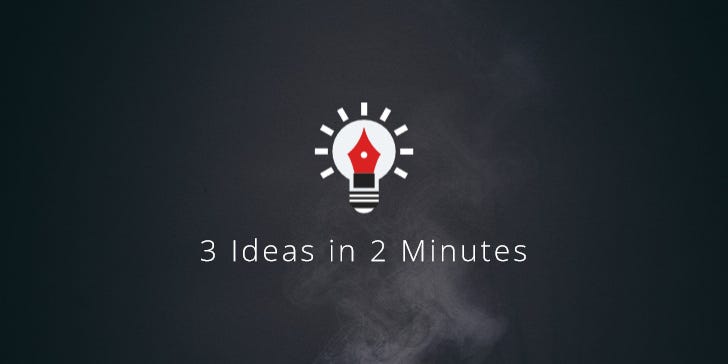#163: Thinking Critically, Gut Feelings & the Causation Trap
3 Ideas in 2 Minutes on Thinking Critically
I. Thinking Critically
What is critical thinking? Let’s hear from John V. Petrocelli, author of a book with the colourful name The Life-Changing Science of Detecting Bullshit:
Critical thinking is a learned process of deliberation, fact checking, and self reflection used to comprehend and appropriately evaluate information in order to decide what to believe or what to do.
―John V. Petrocelli
II. Gut Feelings
There’s more to thinking than following highly analytical, data-driven, deliberative decision-making processes. German psychologist Gerd Gigerenzer makes the case for listening to your Gut Feelings:
[A] gut feeling, or an intuition, is based on years of experience, and it has the following features. It usually is quickly in your mind. So you know what you might do. But, you can't explain why. Nevertheless, it guides much of our personal and also professional decisions. So, a gut feeling is not something arbitrary. It's not as sixth sense. And it's also not what women have. Men also have gut feelings.
There is a suspicion around gut feelings that is widespread in the Social Sciences that they would always be second best and misleading. The problem is, if one would not listen to one's gut — that means, to the experience that's stored in the brain or in those parts of the brain who can’t talk — then one would lose lots of important information.
—EconTalk, Gerd Gigerenzer on Gut Feelings
III. Causation Trap
Beware of the Causation Trap, as correlation does not imply causation. Conflating the two is one of the most common mistakes in interpreting information. When we assume a relationship between two variables, thinking that one causes the other can lead to false conclusions and poor decisions.
Social psychologist Jonathan Haidt gave two perfect examples in one of my favourite lectures of his. Presenting data on autism and organic food sales, he asks sarcastically:
As autism has been going up in the 90s...so has organic food sales...! What do you think? Do you think that autism is caused by organic food? Or do you think that it's autistic people who buy organic food and that's why they go up? Which is it? […] Probably neither.
Because correlation does not imply causation! Even though we're often tempted to see causal relationships where there are none. 🐘
Have a great week,
Chris
themindcollection.com

